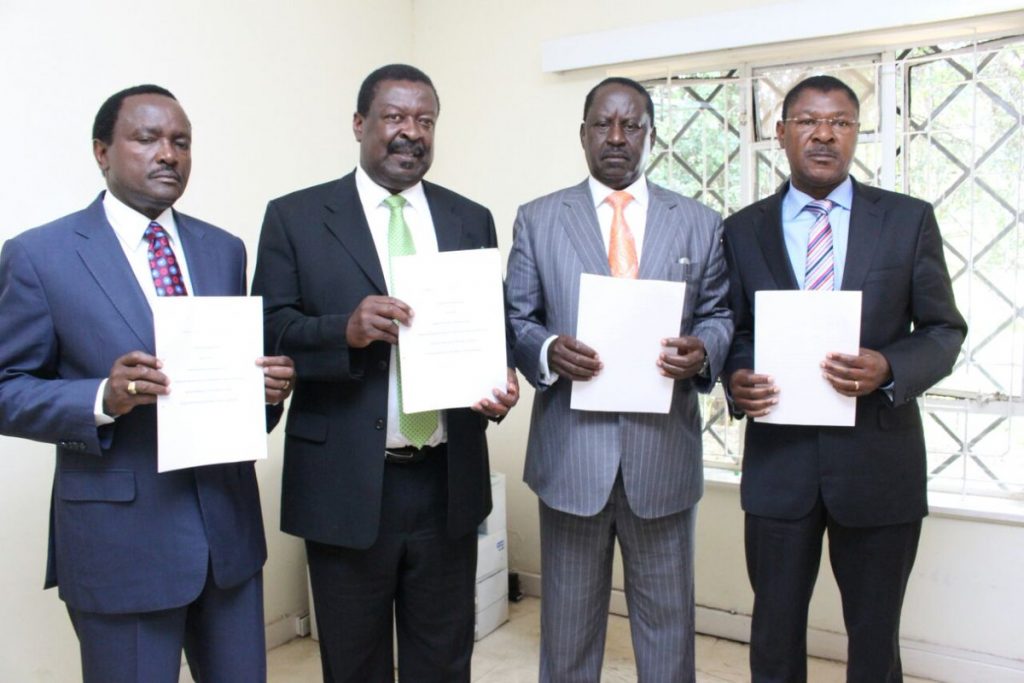By
Joe Khamisi
It is not difficult to understand the unrelenting conundrum that has befallen the four gentlemen at the head of the opposition NASA coalition in Kenya.
For months, representatives of partner parties have been meeting behind closed doors to try to untether the critical question of who, among them, will fly the opposition flag in the August 8 elections against the ruling coalition.
Any one of the four qualifies to sit at State House. The question is: who is the most potent? Who among them has the kind of support across the ethnic divide and carries a knock-out punch to upend Jubilee out and send home Uhuru Kenyatta and William Ruto?
In the absence of a scientific study this question may not be easy to answer, and the usually biased opinion polls are not in a position to help. Nevertheless, because each one of them brings to the table unique leadership qualities the choice must depend not on perceived public support of any particular candidate but on goodwill and compromise.
Only one person can occupy the Executive office. But in democracies all over the world, and for the sake of national unity, close allies are often accommodated in special arrangements to reinforce governance and address the expectations of coalition partners.
This seems to be the likely path NASA will follow. From a constitutional point of view, two of the four already have a place on the high table as President and Deputy President. It could be assumed an understanding may be in the works for a special position of Prime Minister and for the creation of an enhanced role for the fourth partner.
Obviously this arrangement has the potential of congesting the top and even unleashing schisms, if not properly handled. But if Raila Odinga, Kalonzo Musyoka, Musalia Mudavadi and Moses Wetangula, are determined to maintain their unity as they say they are – and have the desire to vanquish Uhuru – then concessions must be factored in.
However, for now, settling on a compromise candidate remains a juggernaut for the expanded opposition organization. Each one of them wants to be the boss not an underling.
Unfortunately, this procrastination is frustrating supporters and eating up time. I am not surprised it’s causing so much public speculation over NASA’s unity and survival.
From my small magnifying glass this is how I see this play out among the candidates based on media reports.
Raila will easily sweep the larger Nyanza; take two-thirds of Western votes; take two-thirds of the Coast, half of the Rift Valley, North-Eastern and Eastern regions, and capture at least 50% of Nairobi. He will collapse badly in Kikuyuland.
Kalonzo, on the other hand, will raid the Eastern votes – despite the minimal opposition there; capture a quarter of Nairobi; get a quarter of the Coastal and North-Eastern votes; but flounder miserably in Nyanza, Western and Central.
Musalia and Wetangula will just toggle along and divide the remaining portion of the splintered Western votes in the region and in the Luhyia Diaspora.
So, what does this mean? It means Raila remains the man to beat. If Kalonzo is included in the ticket as Deputy President, the game could be over early in a free and fair election.
But a consensus must be reached so that NASA can go to the elections as a unified force. The insistence by individual parties that “it’s our way or the highway” threatens to torpedo everything the group has worked for.
If Raila for some reason decides to drop out in favor of any of the three, then whoever is NASA’s top gun will give Jubilee a run for its money. But that proposition of dropping out appears untenable.
Another thorny issue facing the opposition surrounds the nomination process. There are those who want an open process where all parties compete at the grassroots and come up with one unified candidate, and those who prefer that NASA fields one candidate per seat to avoid competition and acrimony in the primaries.
This is a perennially tricky issue facing parties and NASA must face it now.
In my opinion, this is the issue which will determine whether or not a unified NASA will win majority seats and take control of Parliament, the Senate, and County Assemblies.
Personally, I prefer that everyone participates in the nominations and whoever wins carries the banner. It makes no sense to reprise old unworkable methods that have resulted in loss of seats to appease a few who want to shun competition. Let democracy prevail.
And that is my say.
Joe Khamisi
Joe Khamisi is a former journalist, diplomat and Member of Parliament. He is also the Author of ‘Politics of Betrayal:Diary of a Kenyan Legislator‘, a political memoir about the situation in Kenya between 2001, when the ruling party of President Daniel Arap Moi, the Kenya African National Union (KANU), merged with Raila Odinga’s National Development Party.
The book also narrates cases of corruption in Parliament and in the Media and records Senator Obama’s visit to Kenya in 2006. As a friend of Barack Obama Senior, the author also remembers the times and tragedies of the American-educated economist.
Joe Khamisi’s second book, a biography, ‘Dash Before Dusk’ is also now on sale.
Joe’s latest book is ‘The Wretched Africans: A Study of Rabai and Freretown Slave Settlements‘ which has recently been published and is now available to purchase.






No Comments Yet!
You can be first to comment this post!